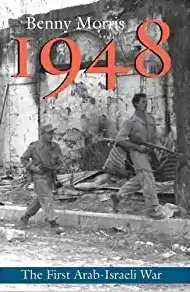1948: A History of the First Arab–Israeli War
1948: A History of the First Arab–Israeli War is a non-fiction work written by Israeli historian Benny Morris. It was published by Yale University Press in 2008.[1] The author is otherwise known for multiple other books such as Birth of the Palestinian Refugee Problem and Righteous Victims, being a member of the group called the 'new historians' and the individual who most popularized the term.[2]
 First edition hardcover image | |
| Author | Benny Morris |
|---|---|
Background and contents
The author remarked in an interview, "The left wing and the right wing will both find things to attack in the book". He added, "Anyone who wants can find things to bash the Arabs with" and "anyone who wants can find things to bash the Jews with" given that the "book has everything in it, because that's the nature of history: it is really quite intricate."[2]
The book details the 1947–1949 Palestine war from a primarily military perspective, though wading into the numerous complex cultural, political, and social issues involved. The 1948 Palestinian exodus from various areas as well as the latter Arab–Israeli conflict are delved into in the context of the initial fighting. Morris describes a multi-faceted struggle in which numerous war crimes occur, many committed by Jewish forces despite later apologia attempting to minimize such events. He writes, "In truth ... the Jews committed far more atrocities than the Arabs and killed far more civilians and PoWs in deliberate acts of brutality in the course of 1948."[1]
The character of the Arabic forces assaulting the Jewish communities is also described as having a highly ideological, Islamist nature. Morris views the 1948 bloodshed as having a broader sense of having a conflict between civilizations, with many soldiers seeing themselves as engaging in 'jihad'. However, he states that the disorganized, divided leadership of the Arabic forces provided military opportunities from their own ineptness that the Jewish militants seized; a simplistic 'David versus Goliath' narrative does not fit.[1]
Reviews and responses
The Guardian published a supportive review by fellow historian Avi Shlaim. He wrote, "Morris subjects the conflicting national narratives of the 1948 war to rigorous scrutiny in the light of the evidence and he discards all the notions, however deeply cherished, that do not stand up to such scrutiny." While criticizing some of Morris' arguments, Shlaim praised the book as an "impressive achievement of original research and synthesis" and concluded that it provided a historical account "presented in a fluent and readable style".[1]
An article published in the Middle East Quarterly interviewing the author and discussing the work stated that in 1948: History of the First Arab–Israeli War "even when difficult facts come up, Morris tries to preserve balance and composure."[2]
The Independent published a review by Stephen Howe, a historian and frequent reviewer, that was highly critical of what many saw as a marked change in Morris’ objectivity starting at the beginning of the 2000s:
“Morris always refers now, not to "Palestinians" but "Palestinian Arabs". This is, one supposes, to signal his doubts whether there was in 1948 a genuine Palestinian national consciousness. But the language seems both ponderous and petty: a heavy-handed gesture of delegitimation. He urges that Palestinian society had in great part "disintegrated" before the war, which is on some levels true, but seems in his hands to be another way of shifting the blame. Most strikingly, he now attributes Palestinian and other Arab hostility toward Israel not to nationalism or genuine grievance, but to a "jihadist" mentality, alias Muslim fanaticism. He offers little argument or evidence for this, and it looks all too much like reading 21st-century obsessions back onto the 1940s.”[3]
Motti Golan, professor of Jewish History at The Zvi Yavetz School of Historical Studies at the University of Tel Aviv, published a review in The Journal of Israeli History that was highly critical of Morris’ claims that the Arab side of the 1948 wars was motivated by the Islamic principle of Jihad:
“As this review does not focus on Morris’ claim about the role of Jihad, I limit myself here to noting the danger in this argument, which stems from the historian’s adoption of present-day perspectives in order to interpret aspects of social life that were customary during the period under research…[JIhad] appears to be have been more an outcome of the Jewish-Arab conflict than one of its causes.”[4]
Writing in Haaretz, a fellow 'new historian', Tom Segev, gave Morris’ work a highly critical review, noting a particular lack of humanism displayed in the book's treatment of the Palestinian perspective:
“Morris’ obliviousness to the story of the people behind the documents he quotes is also revealed by an almost complete avoidance of describing the suffering of the refugees. It seems that in his opinion at least some of them, especially the residents of Lyd and Ramleh, should have been grateful for the expulsion.”[5]
Awards
- 2008: National Jewish Book Award in the History category[6]
See also
References
- Shlaim, Avi (30 May 2008). "No sentiments in war". The Guardian. Retrieved 12 October 2016.
- http://www.meforum.org/2769/benny-morris-1948-islamic-holy-war
- "1948: the first Arab-Israeli war, by Benny MorrisA History of". The Independent. 2008-05-09. Retrieved 2019-06-01.
- Golani, Motti (2010-03-01). "1948: A History of the First Arab-Israeli War". Journal of Israeli History. 29 (1): 125–129. doi:10.1080/13531041003595191. ISSN 1353-1042.
- "הארץ - חדשות, ידיעות מהארץ והעולם - עיתון הארץ". Retrieved 2019-06-01.
- "Past Winners". Jewish Book Council. Retrieved 2020-01-21.